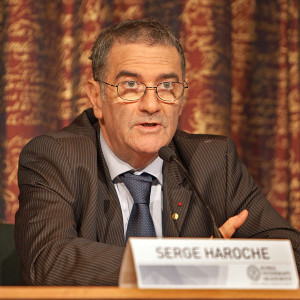To start 2013 with a (big!) bang, I’m extremely honored to welcome Serge Haroche, Nobel Prize Winner 2012 in Physics.
Receiving his prize on Dec 10th, 2012 in Stockholm, Serge explained:
“I studied the infinitely small because I was fascinated by the infinitely large: the planets’ movement!”
Serge has been so generous to share with us his experience as a very particular Third Culture Kid (a child who spent a significant part of his childhood outside the parents’ culture).
And you’ll see that in terms of multicultural aspects too, Serge is a man of contrasts.
When I asked Serge about his origins…
Serge: “I was born into a Jewish family, in a Muslim country, Morocco. My father was French, my mother Russian, emigrating when she was 8 years old. My father was born in Morocco and helped to establish the Alliance Française in North Africa and Turkey. The Alliance Française in Morocco played a determining role in transmitting the French culture to all those countries.”
When thinking that culture shock comes from changing countries…
Serge: “My bigger culture shock was when I went to the French primary school in Casablanca. I was speaking and reading Russian fluently at that time but when I entered the school at 6 years old, I stopped completely. I guess it was because I did not want to be different from the other children. Now I can’t remember anything. I lost it completely and I regret it.”
I consulted François Grosjean on this behavior and he confirmed that this attitude is typical of children or adolescents. When bilinguals become aware that the others are not speaking one of their languages or even worse that the language is negatively tainted, they drop it so as to belong to the group. They know on the other hand that they’ll still be understood by their parents so this language becomes unnecessary and even embarrassing.
The next question is: what can research tell us about the possibility of retrieving a language, even decades after?
In this article, François Grosjean provides some clues. According to Noam Chomsky first (that he interviewed in person), even if a person can no longer use a language, he/she can relearn the language much faster than someone who has never known that language.
“There’s got to be a residue of the language somewhere …. You can’t really erase the system”, aldus Chomsky. Click to tweet
And this is the hope provided by a Swedish study as described here.
The key is reexposure. So, Professor Haroche, it’s a good excuse to seek an invitation from Moscow or St Petersburg University, isn’t it?
When thinking that moving to another country implies discovering a new culture…
Serge: “When Morocco ceased being a French protectorate and acquired its independence in 1956, my parents decided to move to Paris as they were afraid of a culture change (with the Arabisation of the country). I was 12 years old. I came from a French school system in Morocco and joined a French school in Paris. Moving from Morocco to France meant continuity. There was no culture shock. The biggest shock was the climate change!
In this short conversation with Serge Haroche, I learnt three unusual facts:
• Being born in a country heavily influenced by another country sheds another light on the typical expatriate experience.
• Culture shock can happen even by remaining in the same country.
• Sometimes moving to a different country is just THE reason to avoid a culture shock.
Now, dear reader, I’d love to hear whether you found this surprising too! Looking forward to reading your thoughts in the comments.
